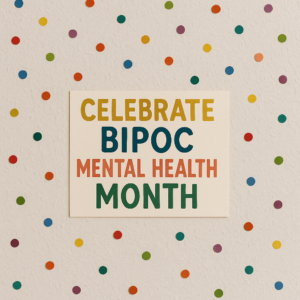 July marks BIPOC Mental Health Month (formerly Minority Mental Health Awareness Month), a time dedicated to recognizing the unique mental health challenges faced by Black, Indigenous, and people of color. This observance reminds us that systemic inequities, cultural stigma, and intergenerational trauma all shape our well-being and that acknowledging these realities is the first step toward healing and empowerment.
July marks BIPOC Mental Health Month (formerly Minority Mental Health Awareness Month), a time dedicated to recognizing the unique mental health challenges faced by Black, Indigenous, and people of color. This observance reminds us that systemic inequities, cultural stigma, and intergenerational trauma all shape our well-being and that acknowledging these realities is the first step toward healing and empowerment.
If you are a part of the BIPOC population, it isn’t always easy to know when to ask for help. You might notice signs such as persistent feelings of sadness or anxiety, difficulty sleeping or concentrating, or a loss of interest in activities you once enjoyed. Pay attention to changes in appetite, energy levels, or substance use, as well as increased irritability or social withdrawal. If these symptoms last more than two weeks or begin to interfere with work, school, or relationships, it’s time to connect with a trusted support system or professional resource.
A strong support system serves as a vital lifeline for mental well-being, offering emotional validation, practical assistance, and a sense of belonging when life feels overwhelming. Whether it’s an attentive friend who listens without judgment, a mentor who shares coping strategies, or a therapist who offers professional guidance, each connection helps us navigate stress, process difficult emotions, and celebrate successes. For BIPOC communities in particular, where cultural stigma and systemic barriers can make accessing care more challenging, a diverse network of supporters, including family, peers, spiritual leaders, and advocacy organizations, ensures that no one has to face their struggles alone. By leaning on these relationships, we not only bolster our own resilience but also cultivate a culture of collective care that uplifts everyone.
Below is short activity that help you to identify who your support system are and if there is room for improvement.
Circles of Support
Mapping your support network can make help feel more accessible. Draw three concentric circles on a blank page:
- Inner Circle: List people you trust unconditionally—family members, close friends, or mentors.
- Middle Circle: Include those you turn to less frequently but still rely on for encouragement, this can be co-workers, spiritual leaders, or peer groups for example.
- Outer Circle: Note formal supports such as therapists, community organizations, or crisis hotlines.
When you visualize your circles of support, you can quickly identify gaps. Perhaps you have strong personal connections but haven’t tapped into professional services. This activity empowers you to strengthen weak areas, whether by scheduling a therapy session, joining a BIPOC support group, or reaching out to an ally at work.
You may not be a part of the BIPOC community but you can still be an advocate and a great supporter. Below are a few simple ways that you can show your support to the BIPOC population.
- Listen Actively: Create space for BIPOC colleagues or loved ones to share without judgment. Reflect what you hear and validate their experiences.
- Educate Yourself: Learn about cultural stressors, such as racial trauma or microaggressions and avoid minimizing their impact.
- Offer Practical Help: Whether it’s sharing mental health resources, accompanying someone to an appointment, or simply checking in regularly, concrete actions build trust.
- Advocate for Change: Use your voice to challenge stigma in your community or workplace. Support policies that expand culturally competent care and equitable access to services.
BIPOC Mental Health Month calls us to honor our shared resilience and to reinforce the networks that sustain us. By recognizing when to seek help, mapping our circles of support, and actively showing up for one another, we cultivate communities where every individual feels seen, heard, and valued. In doing so, we not only break down barriers to mental wellness but also build a foundation of collective care that can endure far beyond the month of July. If you are a part of the BIPOC community and would like to start your journey of mental wellness, we would love to assist you! You can reach out to us at 518-462-6531 to make an appointment. Capital EAP can also assist if you are not a part of the BIPOC population and would like to be a better advocate or would like to explore ways that you can support. You can reach out to us at 518-462-6531 to get connected to a counselor who can assist you on your journey.
By Denelle Abel, LMHC, EAP Clinical Supervisor
